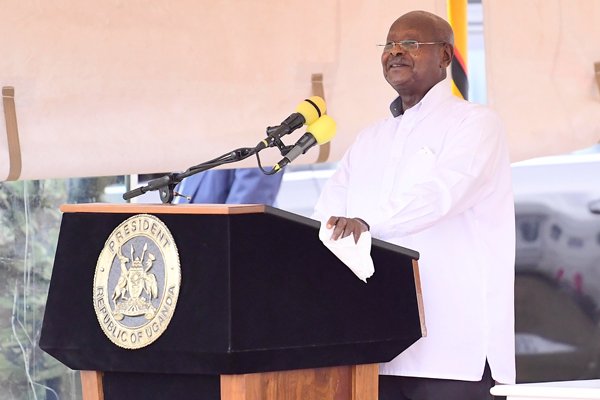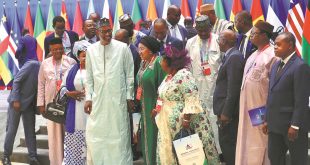Published:June 09,2022
By Elizabeth Kamurungi & Arthur Arnold Wadero

President Museveni delivers the State of the Nation Address in Kampala on June 7, 2022. PHOTO/PPU
- The President announced that the country had made the delayed leap into lower middle-income category.
President Museveni yesterday struck an optimistic tone about Uganda’s economy and future, despite the ravages of rising cost of living, announcing that the country had made the delayed leap into lower middle-income category.
The minimum threshold for lower middle-income is, according to the World Bank, a per capita income of $1,046, or Shs3.7m, which the President said Uganda had attained for the first time.
If sustained for two to three consecutive years, he said, the country would officially be declared a member of lower middle-income category, joining regional neighbours Tanzania and Kenya.
Delivering his annual State-of-the-Nation Address (SONA) at Kololo Ceremonial Grounds in Kampala, where he announced that the economy had steadied despite Covid-19 pandemic disruptions, Mr Museveni said: “The Ugandan economy, by the Budget time in the next few days, will be standing at $45.7 billion by the exchange rate method and at $131.6 billion by the Purchasing Power Parity (PPP) method. This means the GDP per capita is now $1,046. You remember, the entrance points for the lower middle-income status is $1,036. We have now passed that figure. Congratulations!”
The other side of the coin
This good news notwithstanding, the spike in prices of groceries and accompanying escalation cost of living mean more Ugandan families are now finding it harder to put food on the table.
Uganda Bureau of Statistics, the official government statistics agency, reported inflation climbing to double digits, with fuel-induced price rise 40-plus percent higher.
The price per litre of fuel has increased by between Shs800 and Shs1,000, depending on the supplier and location, in some cases diesel cost outstripping petrol.
This has increased transportation fares and production costs, both adding to the burdens of producers and consumers alike. Despite these, President Museveni maintained that his government would allow market forces of supply and demand to correct the imperfections, arguing that slashing taxes or introducing subsidies, as suggested by some experts, would be a “trap”.
As an alternative solution to what he termed as an artificial problem birthed by the reopening of the global economy after a two-year Covid-induced lockdown and lately Russia’s invasion of Ukraine, Mr Museveni said his government is playing mediator to diffuse the conflict.
“Cutting taxes or subsidies is suicidal because our people may buy carelessly and drain our reserves. It will also take money away from planned projects to consumption,” he noted, reading from a prepared text.
He urged Ugandans to scale up production to meet rising global demand and cover gaps created by other market leaders-turned hoarders. “I saw on the news that Malaysia had banned the export of chicken and that India had banned the export of sugar. (United States) President (Joe) Biden was crying for baby formula, etc.
Many of these products are the ones that have been in surplus in Uganda. We just need to deal with a few quality and bio-hazard issues,” he added.
The new Parish Development Model (PDM), which bureaucrats have touted as a panacea to Uganda’s problems, will cement the country’s production capacity.
PDM is a Shs1 trillion kitty created by government to give cash directly to each of Uganda’s parishes so that residents choose and invest in enterprises they deem most profitable.
The idea is to put more money in the pockets of ordinary citizens, helping to get nine million peasant households into the monetised economy.
According to the President, the government plans to invest in the use of fertilisers and irrigation to scale up production, and he urged farmers to desist from always waiting on the government to provide inputs.
Museveni also strongly spoke against the exportation of goods in their raw form, saying this robs the country through unequal foreign exchange.
“The total value of coffee in the World is $460 billion,” he said, adding: “…yet coffee growing countries such as Uganda collectively get a paltry $25 billion.”
He said the reason is export of raw coffee, which foreigners process and sell back more expensively.
“What is wrong with us, what is wrong with Africa?” he asked, sounding frustrated. He added: “When we de-hust, roast, grind and pack [coffee] here, Uganda will get more dollars and we shall also pay higher prices to our farmers. We oppose this haemorrhage in all the raw-materials … It is this haemorrhage that is responsible for the stagnation of Africa.”
monitor.co.ug
 Africa -China Review Africa -China Cooperation and Transformation
Africa -China Review Africa -China Cooperation and Transformation
